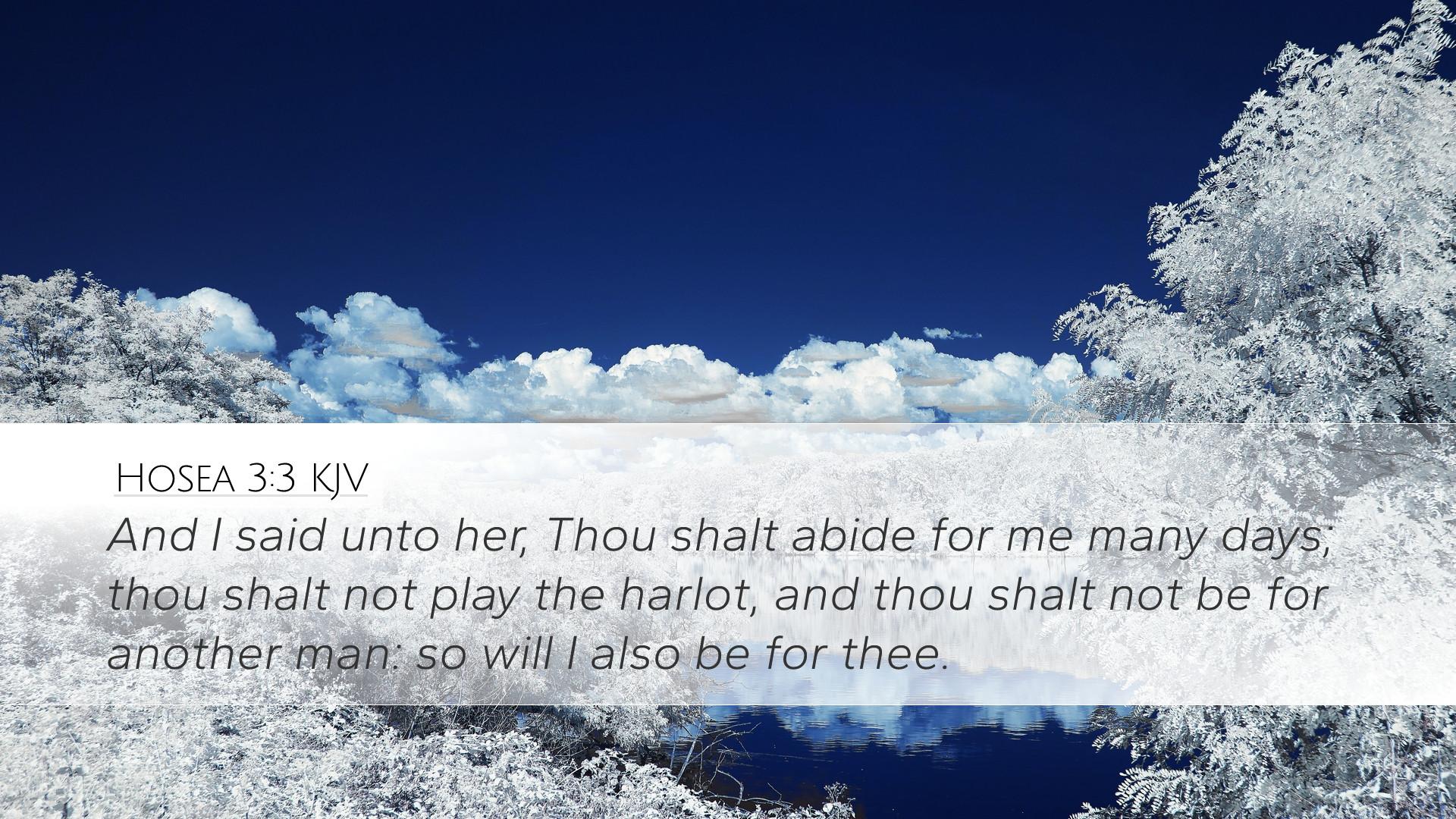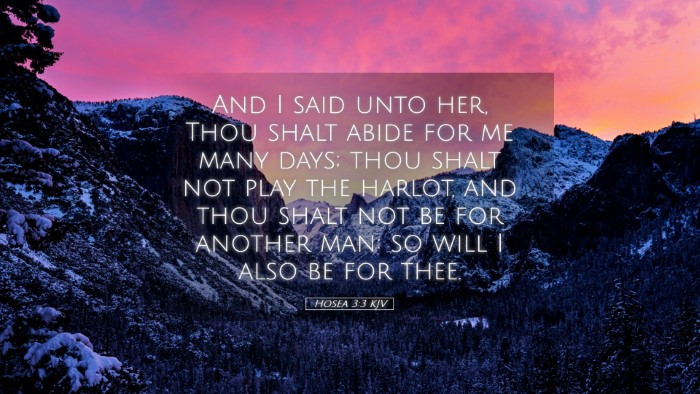Old Testament
Genesis Exodus Leviticus Numbers Deuteronomy Joshua Judges Ruth 1 Samuel 2 Samuel 1 Kings 2 Kings 1 Chronicles 2 Chronicles Ezra Nehemiah Esther Job Psalms Proverbs Ecclesiastes Song of Solomon Isaiah Jeremiah Lamentations Ezekiel Daniel Hosea Joel Amos Obadiah Jonah Micah Nahum Habakkuk Zephaniah Haggai Zechariah MalachiHosea 3:3
Hosea 3:3 KJV
And I said unto her, Thou shalt abide for me many days; thou shalt not play the harlot, and thou shalt not be for another man: so will I also be for thee.
Hosea 3:3 Bible Commentary
Commentary on Hosea 3:3
Text of Hosea 3:3 (KJV): "And I said unto her, Thou shalt abide for me many days; thou shalt not play the harlot, and thou shalt not be for another man: so will I also be for thee."
Introduction
The book of Hosea is imbued with rich theological insights that express God's enduring love and commitment towards a wayward Israel. In the context of Hosea 3:3, the prophet illustrated this theme through his own life, positioning himself as a mirror to God's relationship with His people.
Exegesis of Hosea 3:3
The verse is a continuation of the narrative where Hosea is commanded to take back his wife Gomer, symbolizing Israel's unfaithfulness to God. This verse reflects a profound metaphor of restoration, faithfulness, and expectation.
-
Command to Gomer:
Hosea's statement, "Thou shalt abide for me many days," suggests a duration of commitment, indicating an end to the cycle of betrayal and infidelity. This metaphorically reflects God's desire for a lasting relationship with Israel.
-
Exclusion of Infidelity:
The proclamation, "thou shalt not play the harlot," underscores the expectations of fidelity inherent in the covenant relationship between God and His people. It serves as a poignant reminder of the serious nature of spiritual adultery.
-
Mutual Commitment:
Hosea's declaration, "so will I also be for thee," signifies the reciprocal nature of love and commitment that God seeks from His people. It emphasizes that divine fidelity complements the expectation of human faithfulness.
Theological Themes
This verse encapsulates several theological themes relevant for modern readers, especially pastors, students, and scholars.
-
Divine Love and Grace:
In spite of Israel's unfaithfulness, God's love remains steadfast. Hosea's act of seeking Gomer is reflective of God's relentless pursuit of His people. This theme of grace highlights the unmerited favor of God, which invites repentance and reconciliation.
-
Faithfulness in Relationship:
Hosea's commands denote the seriousness of covenant fidelity, an essential characteristic of divine-human interactions. Understanding this faithfulness prompts deeper reflections on personal devotion and the nature of commitment in Christian faith.
-
Hope and Restoration:
Even amidst betrayal, restoration is possible. This verse underlines the hope found in turning back to God, as He remains ready to restore the broken covenant. It calls individuals and communities to embrace repentance and seek reconciliation with God.
Commentary Insights
Matthew Henry:
Henry emphasizes that this verse portrays the great love of God, which is not conditional upon human faithfulness. Instead, it stresses the unilateral aspect of God's covenant love that persistently seeks its people, advocating for the recognition of one’s flaws and a returning to divine grace.
Albert Barnes:
Barnes notes that Hosea’s dialogue with Gomer encapsulates God’s longing for Israel to refrain from idolatry. He elucidates that the language used indicates a period of waiting and hopeful anticipation for loyalty to be renewed and for Israel to return to the true God.
Adam Clarke:
Clarke points out the personal nature of this divine instruction and its implications for human relationships. He insists that the essence of true love is steadfastness even in adversity. In light of Clarke's insights, the verse could be seen as a challenge to contemporary believers to reflect on their own adherence to God amidst societal distractions.
Practical Applications
For pastors, theologians, and Bible students, Hosea 3:3 provides profound implications for contemporary Christian life and ministry.
-
Call to Holiness:
This verse serves as a clarion call to maintain holiness in one’s life. Faithfulness to God requires not only an acknowledgment of His love but an earnest effort to reject all forms of unfaithfulness in worship and daily living.
-
Modeling God’s Love:
The act of pursuing reconciliation exemplified in this passage serves as a model for believers to reach out to those who have strayed. Ministries focused on restoration can take inspiration from God’s unwavering commitment to the wayward.
-
Understanding the Cost of Sin:
Believers are urged to recognize the implications of infidelity in the context of their relationship with God. This awareness fosters a deeper understanding of repentance, the need for forgiveness, and the transformative power of grace.
Conclusion
Hosea 3:3 provides an intimate portrayal of divine love and the complex nature of the relationship between God and His people. The lessons embedded within this verse extend beyond ancient Israel, inviting all readers into a transformative journey characterized by fidelity, love, and redemption. As we reflect on this profound verse, may we be inspired to embrace the faithful love of God, reflect it in our relationships, and pursue a covenant life of unwavering commitment to Him.


